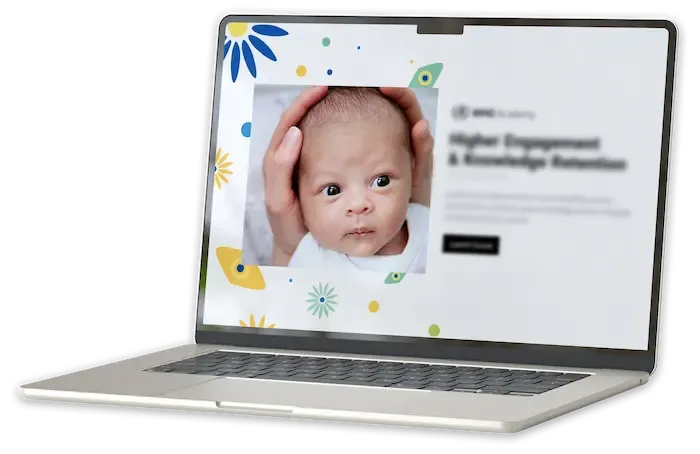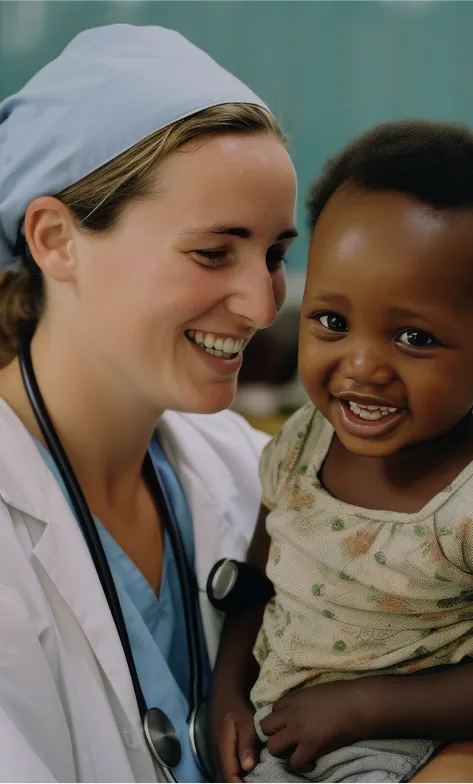StrengtheningChild Healthcare Trainingwith Interactive eLearning

Project Overview
Millions of children suffering from potentially fatal illnesses visit primary-level health facilities every day. To ensure accurate diagnosis, effective treatment, and proper parental guidance, our client developed the Integrated Management of Childhood Illness (IMCI) strategy—a structured six-step process aimed at improving case management, treatment adherence, and communication among healthcare providers.
As a trusted eLearning development partner, we created a 9-module training program that enabled caregivers and healthcare workers to understand, diagnose, and manage childhood diseases while clearly communicating treatment plans to parents.
To drive engagement and retention, the training featured animations, interactive learning elements, and real-life scenarios—transforming critical pediatric knowledge into a practical, accessible learning experience.

Objective
& Scope
The primary objective of this initiative was to equip frontline healthcare workers with structured, scenario-based training to improve the early diagnosis, treatment accuracy, and case management of childhood illnesses. By integrating interactive learning modules, medical animations, and real-world scenarios, the program aimed to strengthen decision-making skills, treatment adherence, and caregiver communication.
Challenges
01
Complex Medical Concepts for Frontline Healthcare Workers
The course needed to simplify medical guidelines and IMCI protocols into an easily digestible and practical learning experience.
01
02
Global Childhood Diseases:
A Visual Guide
The wide variety of childhood illnesses required dynamic storytelling and medical animations to enhance understanding.
02
03
Ensuring High Engagement & Practical Application
The course needed to bridge the gap between theory and real-world application, ensuring that learners could confidently diagnose and manage cases in live healthcare settings.
03
Our Approach
Bringing IMCI Training to Life with Engaging eLearning
Comprehensive Curriculum Covering 9 Critical Child Health Areas
We developed 9 structured modules, covering key topics such as:
- Introduction
- Malnutrition
- Child Development
- Anaemia
- HIV-AIDs
- Ear Problems
- Growth Monitoring & Feeding
- Fever
- Immunization and preventive measures
01
Scenario-Based Learning for Real-World Decision-Making
The modules walked learners through patient interactions, demonstrating how to assess symptoms, diagnose illnesses, and communicate proper care instructions to parents.
02
Medical Animations for Visual Representation of Diseases
We created engaging animation videos to illustrate disease progression, symptoms, and treatment methods, making complex medical concepts more accessible.
03
Interactive Learning Elements for Maximum Engagement
The program featured sliders, click-and-learn activities, quizzes, and video-based learning, ensuring an active learning experience rather than passive reading.
04
Practical Tools for Immediate Application
The modules included case-based exercises and communication guidance, helping healthcare workers apply IMCI strategies directly in patient care.
Results
Delivered
Transforming IMCI Training for Better Child Healthcare
Improved Diagnosis & Treatment Accuracy
The interactive format and real-life scenarios helped healthcare workers apply knowledge in real settings, leading to more accurate childhood illness detection and treatment.
Empowering Caregivers & Parents Through Better Communication
The focus on effective caregiver-parent communication ensured that treatment guidelines were clearly conveyed, improving at-home child care practices.
Practical & Scalable Training Model
The modular, structured format made it easy for organizations to scale and implement IMCI training across different regions and languages.
Higher Engagement & Knowledge Retention
Learners responded positively to visual storytelling, quizzes, and animations, leading to greater knowledge retention compared to traditional training methods.
Empowering Caregivers & Parents Through Better Communication
The focus on effective caregiver-parent communication ensured that treatment guidelines were clearly conveyed, improving at-home child care practices.
Key Takeaways
Why This Approach Worked
Scenario-Based Learning Bridges the Gap Between Theory & Practice
Learners actively engaged with real-life child health cases, making training more impactful and applicable.
Animations & Interactivity Enhance Medical Training
Visual storytelling and interactive elements helped simplify complex medical concepts, improving understanding and recall.
Scalable & Adaptive Training Model for Global Implementation
The modular structure allows for easy updates, translations, and adaptations to meet regional healthcare needs.
Execution Timeline
This training program consisted of 9 modules, each with multiple lessons, covering essential child healthcare topics. The entire development process starting with POC till the Gold version, was completed within a year. This structured approach ensured high-quality content delivery while maintaining an engaging and scalable learning experience.
Impact
The IMCI eLearning program revolutionized child healthcare training by equipping frontline healthcare workers with practical, scenario-based learning. By integrating medical animations, interactive elements, and real-life case studies, the program enhanced understanding, diagnosis accuracy, and treatment adherence.
The structured, engaging approach led to improved knowledge retention, better caregiver-parent communication, and ultimately, stronger healthcare outcomes for children worldwide.



This project demonstrates our ability to create engaging, interactive, and impactful eLearning solutions for healthcare training. By blending IMCI strategies, scenario-driven learning, and engaging multimedia, we delivered a training experience that enhances clinical skills, improves communication, and ultimately saves lives.
Looking to transform your healthcare training programs? Let’s build impactful learning solutions together.